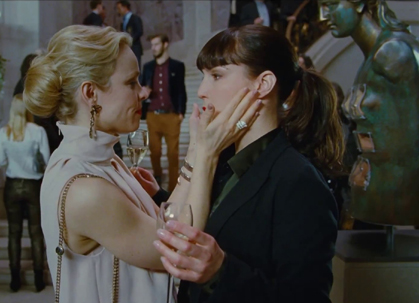CRITIC SURPRISED THAT DE PALMA MADE SUCH A PERSONAL FILM OUT OF CORNEAU REMAKE
 TF1 News Film Critic Romain Le Vern posted a review today of Brian De Palma's Passion, calling it De Palma's "best film since... a long time." Le Vern echoes the review posted yesterday by Jean-Baptiste Morain, each with the suggestion that De Palma has made a personal film that stands among his finest works. Below is a Google-assisted translation of Le Vern's review:
TF1 News Film Critic Romain Le Vern posted a review today of Brian De Palma's Passion, calling it De Palma's "best film since... a long time." Le Vern echoes the review posted yesterday by Jean-Baptiste Morain, each with the suggestion that De Palma has made a personal film that stands among his finest works. Below is a Google-assisted translation of Le Vern's review:"Two women engage in a perverse game of manipulation within a multinational corporation. Isabelle (Noomi Rapace) is fascinated by her superior (Rachel McAdams), Christine. The latter takes advantage of her influence over Isabella to drive into a game of seduction and manipulation, domination and servitude.
"On paper, this new feature by Brian De Palma presents itself as an American remake of the French Love Crime, the last film by the late Alain Corneau and far from the best. A project that a priori portends a controlled movie replay, sterile or impersonal. Surprise: it's not. From Dressed To Kill to Obsession, from Body Double to Snake Eyes, Brian De Palma has always been fascinated with the questions raised by the cinema and could never help but tell (almost) all his stories in the form of mise-en-scène.
"Although we thought he had broken his own obsessions with objects bordering on pastiche (Femme Fatale) and uninspired (his very unsuccessful adaptation of the cult novel by James Ellroy, The Black Dahlia, a very soft sci-fi Mission To Mars) and been ostracized from the system after taking the risk of anti-war Redacted (YouTube version of Casulaties Of War), Brian De Palma has regained form and his Passion marks a return with great fanfare to the overwrought cinema of the 70s Mannerist, reflecting the ambition of a system of manipulation by illusion.
"Hitchcock's ghost still haunts
"This manipulative maze-like film could be terminal like Mulholland Drive, David Lynch, fed self-citations (a lot of Sisters, a little Raising Cain), themes (voyeurism, fetishism, manipulation, schizophrenia, alienation), Biblical symbols and stylistic figures allow the auteur to settle scores. With himself. With his appetite for evil. Hitchcock with his superego.
"In search of beauty in vulgarity - the vulgarity of time exacerbated by the emergence of new media and new ways of espionage (sex tape, YouTube) such as social networks - De Palma films the grimey dreams of innocent girls, probes the impossibility of desire in a world of phallic metal towers in which women make war to seduce men and uses the original frame of Corneau to talk about what has always been connected: the truth rigged, optical illusions, false pretenses, artifice to describe subjectivity (the distortion of time, split-screen, the deformation of reality).
"Above all, we have to see the pleasure of Brian De Palma, simple pleasures and communicative, filming for the beauty of movement, especially in the operatic last half-hour amplified by the music of Pino Donaggio, reviving the best suspensions of disbelief from his past films such as, at random, the suspenseful sequence of the prom in Carrie. The final shot is both climax and nod to De Palma’s aficionados, causing a jolt.
"De Palma directed both actresses (Noomi Rapace and Rachel McAdams, impeccable) like lionesses, savoring the slow devouring of praying mantises. For a long time we do not know who the brunette or blonde, Hitchcock heroine or De Palma-esque bitch, proves the most toxic. But one thing is sure: dream into nightmare, nobody has been innocent."



